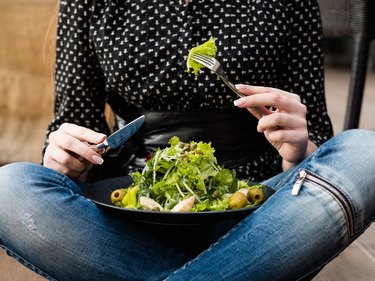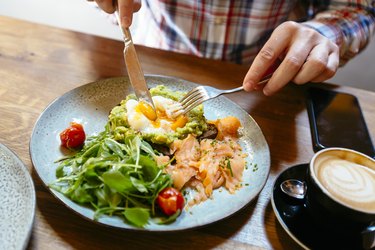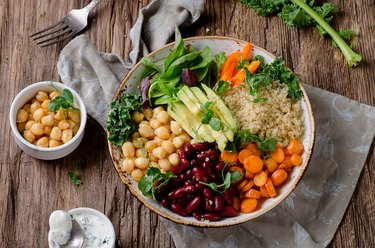
Maybe you feel too full to move about freely or your stomach sounds are loud enough to be heard next door. Either way, being bloated and gassy feels crappy.
While there are countless potential causes of uncomfortable gastrointestinal symptoms, there's no denying that the diet contributes to gut health.
Video of the Day
Video of the Day
"In general, diet is probably the main driver of a lot of GI symptoms," says Shanti Eswaran, MD, a gastroenterologist and internist at Michigan Medicine. "What we eat moves through our body and undergoes transformations as it's broken down by enzymes and bacteria in the GI tract."
When we experience gas and bloating after eating, it's often due to byproducts that are created by bacteria in the GI tract that help break down our food. "Byproducts of what we eat can also increase the water content in the gut, drawing fluids in and making us feel bloated," Dr. Eswaran adds.
The primary cause of gas and bloating is irritable bowel syndrome, or IBS. According to Dr. Eswaran, "IBS is caused by a multitude of different things, but hallmarks include abdominal pain and discomfort and altered bowel function, such as constipation and diarrhea."
People with IBS tend to have "hyper-aware GI tracts," meaning they may experience increased pain or bloating after eating, independent of the type of food they take in.
General tips for decreasing gas and bloat include eating smaller meals throughout the day and avoiding carbonated beverages and eating fewer gas-forming foods (think: beans, cruciferous vegetables, bran and dairy, if not tolerated well).
But what about specific nutrients? Read on for expert takes on the potential connections between common nutrients and your pesky gut problems.
1. Vitamin D

Though research suggests vitamin D deficiencies are particularly prevalent among people with IBS, low levels of the nutrient are not unique to this population.
"The majority of adults living in certain geographies or who lead indoor lifestyles tend to have low vitamin D levels and they are generally related to lack of sun exposure, though obesity is another risk factor," says Tamara Duker Freuman, RDN, a New York City-based dietitian and author of The Bloated Belly Whisperer.
While the exact mechanism by which the two are related remains unclear, several small studies have reported that vitamin D supplementation may be helpful for people with IBS.
One February 2019 study in the International Journal of Preventive Medicine, for example, reported that vitamin D supplementation significantly improved the severity of symptoms and disease-specific quality of life in people with IBS compared to those who did not receive supplementation.
Unfortunately, supplementing vitamin D on its own might not solve your gut-specific symptoms, says Dr. Eswaran.
"However, it may improve general symptoms associated with vitamin D deficiency such as brain fog and fatigue, and if you're feeling well overall, it's possible that your GI symptoms may not bother you as much."
How to Get More Vitamin D
Vitamin D is naturally found in only a handful of foods, including egg yolks, certain types of mushrooms and fatty fish like salmon and sardines, but fortified options are abundant.
You can find vitamin D in fortified dairy products (like milk and yogurt) and plant-based alternatives (like almond, oat, and soy milk), breakfast cereals and some orange juices.
Top Food Sources of Vitamin D
- Fatty fish (salmon, sardines, tuna)
- White mushrooms
- Fortified dairy, soy, oat, or almond milk
- Egg yolks
Recipes to Try
2. Fiber

Fiber can get confusing. For some people, a high-fiber diet can induce or exacerbate gas and bloating. For others, a low-fiber diet may bring on bloat.
"Everyone is different, and you have to evaluate each case of bloating individually to understand what's behind it," Freuman notes. "The same remedy that helps alleviate symptoms in one person can worsen symptoms in someone else."
Let's break it down even further: "A high intake of fiber may lead some people to experience intestinal gas or bloating as the result of a high stool burden, or more fiber coming in than is coming out, which causes stool to build up," Freuman says.
A high intake of fermentable carbohydrates (FODMAPs) from naturally high-fiber foods can also cause intestinal upset in people sensitive to these classes of plants.
On the other hand, a diet lacking in adequate amounts of fiber can also result in tummy troubles for some.
"People with chronically low fiber intake can also experience intestinal gas or bloating if their low fiber intake results in chronic constipation and/or incomplete defecation of hard, small stools," adds Freuman.
So, do we load up on all the fiber or forego it altogether? Neither.
If you're bloated, it's not automatically given that adding more fiber to the diet will alleviate your symptoms.
"However, if someone is bloated due to constipation from a low fiber diet, the right answer is to add fiber very gradually, possibly in tandem with a gentle bowel regimen (or laxative) to help clear out residual stool that is causing a backup so that the fiber will be tolerated better," says Freuman.
As always, make changes with the guidance of a gastroenterologist or registered dietitian, not on your own.
How to Get More Fiber
To up your fiber intake while minimizing your risk of worsening gas and bloat, opt for fiber-containing foods that are lower in FODMAPs and have been texture-modified to decrease the particle size of the fiber, Freuman suggests.
"Smoothies and soups instead of salads, nut butters and nut flours instead of whole nuts and cooked rather than raw veggies may all be better tolerated in people prone to bloating from higher fiber diets," she tells LIVESTRONG.com.
Top Food Sources of Fiber
- Whole grains (brown rice, oats, whole-wheat bread)
- Nuts and seeds (almonds, walnuts, cashews, sunflower seeds, chia seeds)
- Fruits (raspberries, apples, avocado)
- Vegetables (leafy greens like kale,
- Legumes (black beans, kidney beans, chickpeas, lentils)
Recipes to Try
Don't forget to load up on H2O as you add more fiber to your diet.
"Fiber and fluid should always be increased simultaneously," says Lauren Cornell, RDN, a Los Angeles-based registered dietitian and founder of the private practice Lauren Cornell Nutrition.
"Even if you have no intolerances to FODMAPs (most FODMAPs are a form of fiber), increasing your fiber intake without also increasing your fluid intake is bound to cause some gas or bloating."
To avoid discomfort, Cornell recommends increasing your fiber intake gradually by about 3 to 5 grams and staying at that level for a few days before upping your consumption by another 3 to 5 grams.
If you continue to experience discomfort, consult a registered dietitian who can help you better identify your triggers and explore further options such as a low-FODMAP diet.
Related Reading
Was this article helpful?
150 Characters Max
0/150
Thank you for sharing!
Thank you for your feedback!